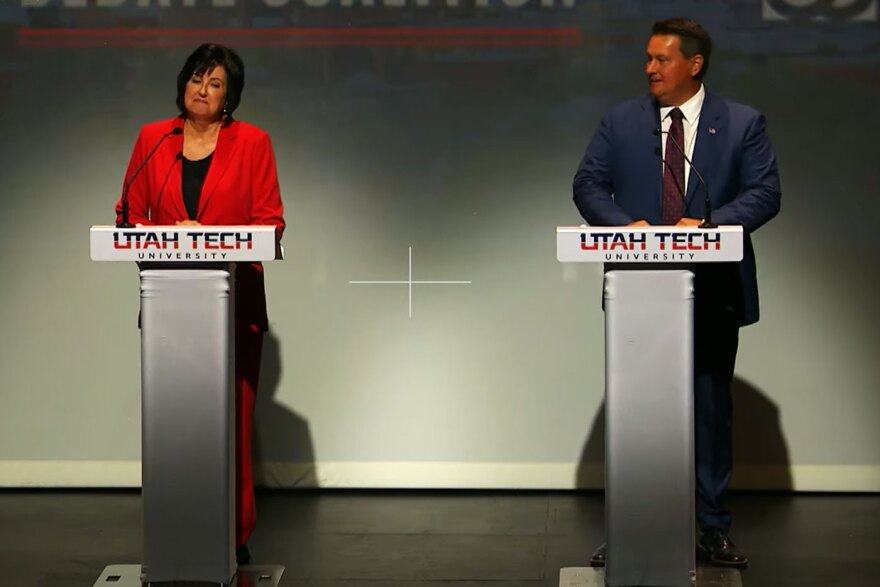One thing appears clear for the future of St. George: Regardless of who wins this year’s mayoral contest, the overall direction of the city won’t be changing much over the next four years.
Incumbent Mayor Michele Randall and challenger Jimmie Hughes met in an Oct. 13 debate at Utah Tech University, organized by the Washington County Debate Coalition and hosted by PBS Utah’s Lauren Steinbrecher.
Overall, the candidates did not show much separation on several key issues facing the city. When it came to infrastructure (they want more of it), the Northern Corridor Highway (they support it) and affordable housing (accessory dwelling units are a good place to start), the two were aligned.
Both candidates sang the city’s praises as a family-friendly place to live. Both attribute that reputation to the people who call St. George home.
“Everybody I meet, and I ask, ‘Why St. George?’ The number one answer is people,” Randall said. “I think that that is what exemplifies the Dixie spirit is that we are still kind and we treat each other with kindness, and that's what brings people here in droves.”
For Hughes, while the city’s weather and scenery may attract visitors, community is what makes St. George special.
“I still believe the reason why people want to come here is our culture and the things that our pioneer ancestors brought here,” he said. “We need to maintain the community spirit that we have.”
Each of those answers nibbled at the edge of what is really on everyone’s mind: growth.
St. George has been one of the fastest-growing cities in one of the fastest-growing counties in the nation. By 2050, the population of Washington County is expected to double to more than 400,000 people. St. George alone is projected to add over 175,000 residents in the next 25 years. That growth may be a boon for the city’s tax revenue, but it has caused some residents to worry about growth happening too fast.
Both candidates say they want to position St. George so it can not only navigate its current growth, but also be well-positioned for decades to come. Hughes characterized the city’s explosive growth as “both a blessing and a curse.”
“When I was born here, St. George was a city of 7,500 people,” he said. “We need to have balanced growth that respects our master plan, that says we know what we want to be when we grow up. Let's keep with that plan, and let's not bow to every pressure to go do something bigger and better.”
Randall also cited the city’s general plan, while maintaining the ability to get creative with areas that are ripe for modernization.
“We are experiencing growing pains. We can't keep people out of this place,” she said. “We also adopted a downtown area plan, and that also helps with when you've got so many aging homes downtown to allow people to do different things with those homes, to either make a duplex or do some mixed-use or run a business out of their home downtown.”
Whoever wins this year’s mayoral race will not only be faced with that ongoing growth management, but will also grapple with perennial issues like water and balancing the pull of change against maintaining the city's unique character and history as the hub of life in southern Utah.
Even though the pair broadly agreed on a number of issues, the candidates did lightly spar on the issue of property taxes. In response to a comment by Hughes insinuating that a proposed tax hike to help fund public safety was the mayor’s idea, Randall disagreed with that assessment.
“I just want to let you know that that property tax increase was brought to us by our budget team and our city manager at the time, saying, if you want to fund public safety at this level, this is what we need,” she said. “That was not my idea.”
Hughes was quick to respond.
“Leadership starts at the top,” he said. “You might want to take credit for all that's good, but we have to take credit for some that's not so good as well. That was promoted from, yes, the staff, all the way up to the top, to the mayor's position.”
Randall’s tenure as mayor has not been without controversy. In 2023, the city was sued over denying a permit to drag show performers, for which it ultimately apologized and settled. Randall also faced protests and accusations of infringing on free speech rights that same year when she temporarily instituted a policy that prohibited in-person public comments at city council meetings.
Despite the few disagreements on stage, Hughes took the opportunity in his closing statement to highlight one of those controversies.
“Sometimes our public feels like we treat listening or public input as a formality versus a necessity,” he said. “I believe we need more opportunity for public input, not less.”
Randall made her closing statement before Hughes, so she did not get the chance to respond. She wrote in 2023, however, that she felt the policy was necessary because “public comment has turned into the same people saying the same things, mostly regarding social issues. It was starting to get very divisive.”
Randall is the 33rd mayor of St. George and the first woman to lead the city. She is seeking her second full term after being appointed at the beginning of 2021 to replace Mayor Jon Pike. She later won the election that November. Randall was previously elected twice to the city council in 2014 and 2018.
Hughes is a St. George native and has served on the city council since 2011. His family owns and operates Hughes Mortuary and a cattle ranch on the Arizona strip.
The two emerged as the top two candidates in August’s primary election and set up a rematch of the 2021 contest, which saw Randall best Hughes for mayor. Election day is Nov. 4. Ballots begin to go out to registered voters Oct. 14.






